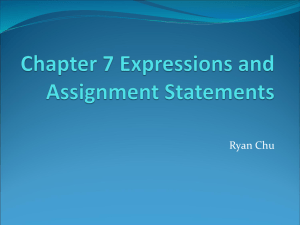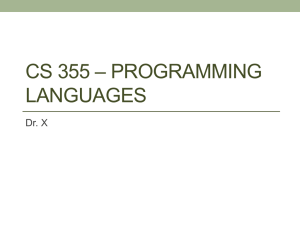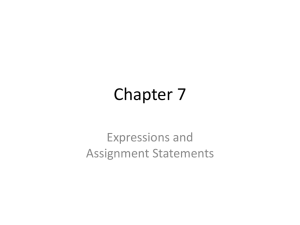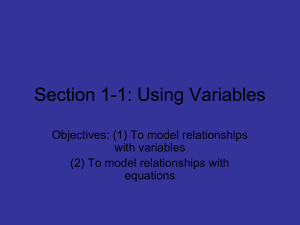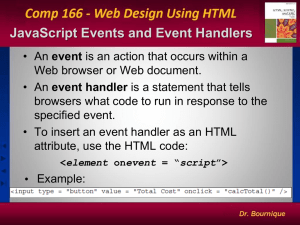PPT
advertisement
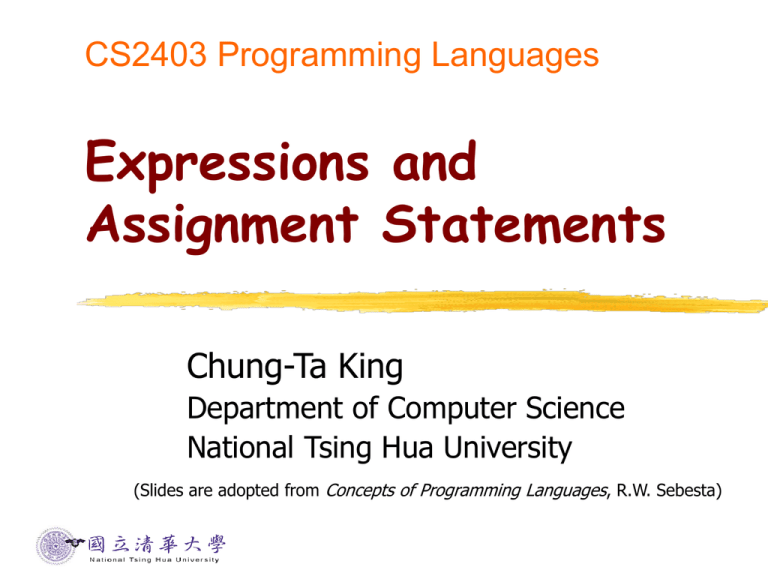
CS2403 Programming Languages
Expressions and
Assignment Statements
Chung-Ta King
Department of Computer Science
National Tsing Hua University
(Slides are adopted from Concepts of Programming Languages, R.W. Sebesta)
Introduction
Expressions are the fundamental means of
specifying computations in a PL
While variables are the means for specifying storage
Primary use of expressions: assignment
Main purpose: change the value of a variable
Essence of all imperative PLs: expressions change
contents of variables (computations change states)
To understand expression evaluation, need to
know orders of operator and operand evaluation
Dictated by associativity and precedence rules
1
Outline
Arithmetic Expressions (Sec. 7.2)
Overloaded Operators (Sec. 7.3)
Type Conversions (Sec. 7.4)
Relational and Boolean Expressions (Sec. 7.5)
Short-Circuit Evaluation (Sec. 7.6)
Assignment Statements (Sec. 7.7)
Mixed-Mode Assignment (Sec. 7.8)
2
Arithmetic Expressions
Arithmetic expressions consist of operators,
operands, parentheses, and function calls
Unary, binary, ternary (e.g., _?_:_) operators
Implementation involves:
Fetching operands, usually from memory
Executing arithmetic operations on the operands
Design issues for arithmetic expressions
Operator precedence/associativity rules?
Order of operand evaluation and their side effects?
Operator overloading?
Type mixing in expressions?
3
Operator Precedence Rules
Define the order in which “adjacent” operators
of different precedence levels are evaluated
Based on the hierarchy of operator priorities
Typical precedence levels
parentheses
unary operators
** (exponentiation, if the language supports it)
*, /
+, -
4
Operator Associativity Rule
Define the order in which adjacent operators
with the same precedence level are evaluated
Typical associativity rules
Left to right, except **, which is right to left
Sometimes unary operators associate right to left
Precedence and associativity rules can be
overridden with parentheses
5
Conditional Expressions
Conditional expressions by ternary operator ?:
C-based languages (e.g., C, C++), e.g.,
average = (count == 0)? 0 : sum / count
Evaluates as if written like
if (count == 0)
average = 0
else
average = sum /count
6
Operand Evaluation Order
How operands in expressions are “evaluated”?
Variables: fetch the value from memory
Constants: sometimes fetched from memory;
sometimes in the machine language instruction
Parenthesized expressions: evaluate all inside
operands and operators first
Operands on the two sides of an operator: evaluation
order is usually irrelevant, except when the operand
may cause side effects, e.g.,
b = a + foo(&a);
7
Side Effects in Expressions
Functional side effects: a function changes a
two-way parameter or a non-local variable
i.e., change the state “external” to the function
Problem with functional side effects:
When a function referenced in an expression alters
another operand of the expression:
a = 10;
/* assume foo changes its parameter */
b = a + foo(&a);
Order in which operand
is evaluated first will
make difference
8
Functional Side Effects
Functions in pure mathematics do not have side
effects, i.e., y = f(x)
Input, x, determines output, y; no states
Same with pure functional programming
languages
Side effects occur due to von Neumann arch.
and associated imperative PL and computation
model (state machines)
Memory/processor, variables/expressions, state/state
change
9
Functional Side Effects
Solution 1: define the language by disallowing
functional side effects
No two-way parameters in functions
No non-local references in functions
Disadvantage: inflexibility of one-way parameters and
lack of non-local references
Solution 2: write the language definition to
demand that operand evaluation order be fixed
Disadvantage: limits some compiler optimizations
Java requires that operands appear to be evaluated
in left-to-right order
10
Outline
Arithmetic Expressions
Overloaded Operators (Sec. 7.3)
Type Conversions
Relational and Boolean Expressions
Short-Circuit Evaluation
Assignment Statements
Mixed-Mode Assignment
11
Overloaded Operators
int a,b;
float x,y;
…
b = a + 3;
y = x + 3.0;
We wish to use the same operator ‘+’ to operate
on integers and floating-point numbers
Let compiler make proper translation, e.g., ADD vs
FADD
How about ‘+’ to operate on two array variables?
12
Overloaded Operators
Use of an operator for more than one purpose is
called operator overloading
Some are common (e.g., + for int and float)
Some are troublesome (e.g., * in C and C++)
Loss of compiler error detection (omission of an
operand should be a detectable error)
Some loss of readability
C++/C# allow user-defined overloaded operator
Users can define nonsense operations
Readability may suffer, even when operators make
sense, e.g., need to check operand types to know
13
Outline
Arithmetic Expressions
Overloaded Operators
Type Conversions (Sec. 7.4)
Relational and Boolean Expressions
Short-Circuit Evaluation
Assignment Statements
Mixed-Mode Assignment
14
Type Conversions
int a,b;
float x,y;
a = y;
x = b;
b = y + a;
How should data be converted for assignment?
What kinds of data format should compiler use
during evaluation of the expressions?
15
Type Conversions
A narrowing conversion is one that converts an
object to a type that cannot include all of the
values of the original type, e.g., float to int
Not always safe
A widening conversion is one in which an object
is converted to a type that can include at least
approximations to all of the values of the
original type, e.g., int to float
Usually safe but may lose accuracy
16
Type Conversions: Mixed Mode
A mixed-mode expression is one that has
operands of different types
Need type conversion implicitly or explicitly
Implicit type conversion by compiler: coercion
Disadvantage: decrease in the type error detection
ability of the compiler
In most languages, all numeric types are coerced in
expressions, using widening conversions
In Ada, there are virtually no coercions in expressions
to minimize errors due to mixed-mode expressions
17
Type Conversions
Explicit type conversion by programmer: casting
in C-based languages, e.g.,
C: (int) angle
Ada: Float (Sum)
Causes of errors in expressions
Inherent limitations of arithmetic, e.g., division by
zero
Limitations of computer arithmetic, e.g. overflow
Errors often ignored by the run-time system
18
Outline
Arithmetic Expressions
Overloaded Operators
Type Conversions
Relational and Boolean Expressions (Sec. 7.5)
Short-Circuit Evaluation
Assignment Statements
Mixed-Mode Assignment
19
Relational Expressions
Expressions using relational operators and
operands of various types; evaluate to Boolean
Relational operators: compare values of 2 operands
Operator symbols vary among languages (!=, /=,
~=, .NE., <>, #)
20
Boolean Expressions
Expressions using Boolean operators and
Boolean operands, and evaluate to Boolean
Boolean operands: Boolean variables, Boolean
constants, relational expressions
Example operators:
FORTRAN 77
.AND.
.OR.
.NOT.
FORTRAN 90
and
or
not
C
&&
||
!
Ada
and
or
not
21
No Boolean Type in C
C89 has no Boolean type: it uses int type with
0 for false and nonzero for true
Expression evaluates to 0 for false and 1 for true
One odd characteristic of C’s expressions:
a < b < c is a legal expression, but the result is
not what you might expect:
Left operator is evaluated, producing 0 or 1
The evaluation result is then compared with the third
operand (i.e., c)
22
Precedence Operators in C
Highest
Lowest
postfix ++, -unary +, -, prefix ++, --, !
*, /, %
binary +, <, >, <=, >=
=, !=
&&
||
23
Outline
Arithmetic Expressions
Overloaded Operators
Type Conversions
Relational and Boolean Expressions
Short-Circuit Evaluation (Sec. 7.6)
Assignment Statements
Mixed-Mode Assignment
24
Short Circuit Evaluation
An expression in which the result is determined
w/o evaluating all operands and/or operators
(13*a) * (b/13–1)
If a is zero, there is no need to evaluate (b/13-1)
Problem with non-short-circuit evaluation
index = 0;
while (index < listlen) && (LIST[index]
!= key)
index = index + 1;
When index==listlen, LIST[index] causes an
indexing problem (if LIST has listlen-1 elements)
25
Short Circuit Evaluation
C, C++, and Java: use short-circuit evaluation
for the usual Boolean operators (&& and ||), but
also provide bitwise Boolean operators that are
not short circuit (& and |)
Ada: programmer can specify either (shortcircuit is specified with and then and or
else)
Short-circuit evaluation exposes the potential
problem of side effects in expressions
e.g., (a > b) || (b++ / 3)
26
Outline
Arithmetic Expressions
Overloaded Operators
Type Conversions
Relational and Boolean Expressions
Short-Circuit Evaluation
Assignment Statements (Sec. 7.7)
Mixed-Mode Assignment (Sec. 7.8)
27
Assignment Statements
The general syntax
<target_var> <assign_operator> <expression>
The assignment operator
= FORTRAN, BASIC, the C-based languages
:= ALGOLs, Pascal, Ada
= can be bad when it is overloaded for the
relational operator for equality (that’s why the
C-based languages use == as the relational
operator)
28
Conditional Targets
Conditional targets (Perl)
($flag ? $total : $subtotal) = 0
Which is equivalent to
if ($flag){
$total = 0
} else {
$subtotal = 0
}
29
Compound Assignment Operators
A shorthand method of specifying a commonly
needed form of assignment
Introduced in ALGOL; adopted by C
Example:
a = a + b
is written as
a += b
30
Unary Assignment Operators
Unary assignment operators in C-based
languages combine increment and decrement
operations with assignment
Examples:
sum = ++count (count incremented, assigned to
sum)
sum = count++ (count assigned to sum and then
incremented)
count++ (count incremented)
-count++ (count incremented then negated)
31
Assignment as an Expression
In C, C++, and Java, the assignment statement
produces a result and can be used as operands
while ((ch = getchar())!= EOF){…}
ch = getchar() is carried out; result is used as a
conditional value for the while statement
Has expression side effect: a=b+(c=d/b)-1
Multiple-target assignment: sum = count = 0;
Hard to tell: if (x = y) and if (x == y)
Perl and Ruby support list assignments, e.g.,
($first, $second, $third) = (20, 30, 40);
32
Mixed-Mode Assignment
Assignment statements can also be mixed-mode
In Fortran, C, and C++, any numeric type value
can be assigned to any numeric type variable
In Java, only widening assignment coercions are
done
In Ada, there is no assignment coercion
33
